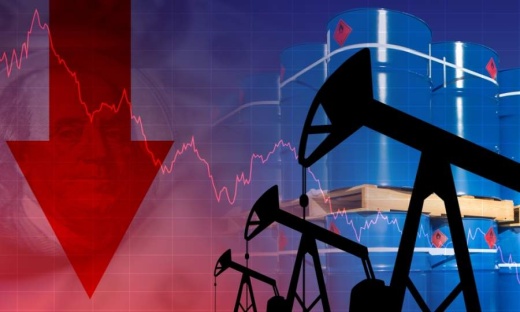Bill Gilmer, director of the University of Houston Bauer Institute for Regional Forecasting, said the crash into negative digits—ending at -$37.63 per barrel April 20, according to Nasdaq Inc.—stemmed from the expiration of oil futures contracts as of April 21.
“What we’re seeing is the expiration of the futures contract yesterday,” Gilmer said April 21. “The problem was there was no place to store all this oil.”
Analysts expected prices for oil per barrel as low as single digits as the scenario unfolded, and while the negative number was likely a one-time event, oil prices may not see major gains for several months, Gilmer said. June contracts were at about $15 per barrel as of the morning of April 21, with July at $23 and fall contracts possibly back into the $35-$40 range again, he said.
“What happened last night was a one-time, end-of-contract event where people could not find places to store [oil],” he said. “Everybody was trying to get out of a contract; it’s as simple as that.”
Social distancing and stay-at-home orders have contributed to a demand decrease taking the global demand for oil down from 100 million barrels a day to about 75 million barrels a day, Gilmer said.
“There is no bottom to this glut, around the world,” he said. “Everybody is on board with trying to limit the production of oil to the extent we can ... so we can try to begin to get back to some fundamentals about what runs an oil market from month to month.”
However, he said if measures to control the spread of the virus are successful and unemployment claims drop, the regional economy could see upward movement as the year advances.
"As long as the fiscal policy, the monetary policy works to hold the economy together and keep that infrastructure working, we have this bridge from before the virus to after the virus that things do go back to normal by the end of this year," Gilmer said. He added oil markets will take longer than the economy as a whole to recover.
On the legislative side, U.S. Rep. Lizzie Fletcher, D-Houston, released a statement April 20 following the oil price drop stating her intention to file legislation for a Strategic Petroleum Reserve purchase.
“The impacts of today’s historic price drop will be felt acutely throughout our community here in the energy capital of the world,” Fletcher said in the statement. “Tomorrow [April 21], I will file bipartisan, bicameral legislation to appropriate funds to make a Strategic Petroleum Reserve oil purchase, and I urge my colleagues to take it up immediately.”
In her statement, Fletcher also related the drop in demand to the coronavirus crisis.
“While this is a smart and important effort, it will not solve the underlying demand problem,” she said. “We must recognize that this price drop is a direct result of decreased demand because of the COVID-19 pandemic, and we must do all we can to combat this virus at home and around the world.”
Alisa Lukash, senior analyst for Rystad Energy, which has offices in Houston, said although federal efforts may preserve some jobs, low oil prices will have an effect in Texas in months ahead.
“The [U.S. Department of Energy] proposal to start paying shale companies to keep oil in the ground will most certainly be discussed today,” Lukash said in an April 20 statement. “It is a creative solution to lower supply, keep some jobs and prevent bankruptcies. Given the seasonality of the current situation temporarily shut-ins most likely wouldn’t affect the strongest upstream producers immediately; however, undeniably the situation puts additional pressure on Texas producers to control volumes [in the] coming months.”
Lukash said Rystad has warned about the possibility of WTI prices going negative. The next step is shut-ins, she said, which would shut currently producing wells.
“If these materialize in the next month, then we can begin discussing optimism in June, but right now, given the likely low compliance of OPEC+ cuts by May 1, the optimism is not yet warranted, and we could see a repeat situation next month,” she said.
Gil Staley, the president of The Woodlands Area Economic Development Partnership, said the prices have an effect on local economies where energy companies are present. In The Woodlands area, one of region’s largest employers, Anadarko Petroleum Corp., was acquired by Occidental Petroleum Corp. in 2019.
"Before, we were looking at oil prices hovering around the $50s [per barrel] and above. To see it drop as low as it is now [April 20] is hugely impactful to our economy,” Staley said. “Now add [the coronavirus] to it, and it is unprecedented. It will take a considerable amount of time [to recover] unless the price of oil rebounds. That's a huge concern to the economy."





